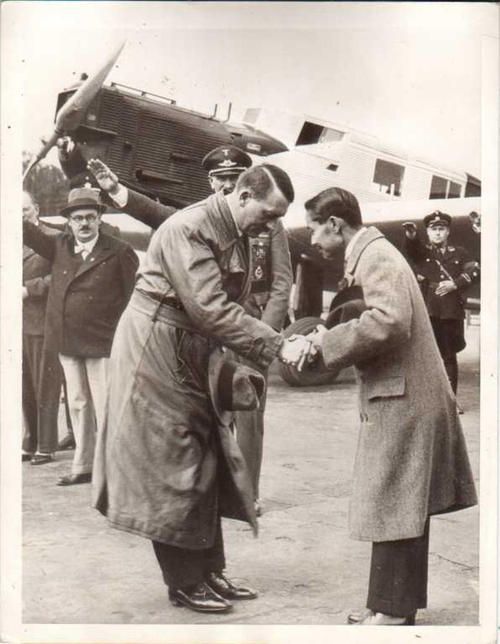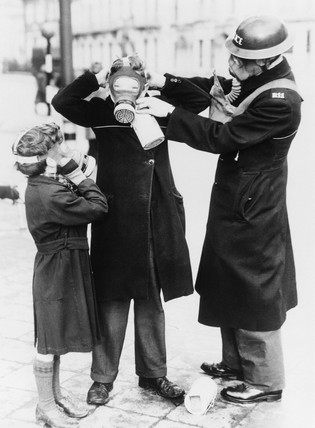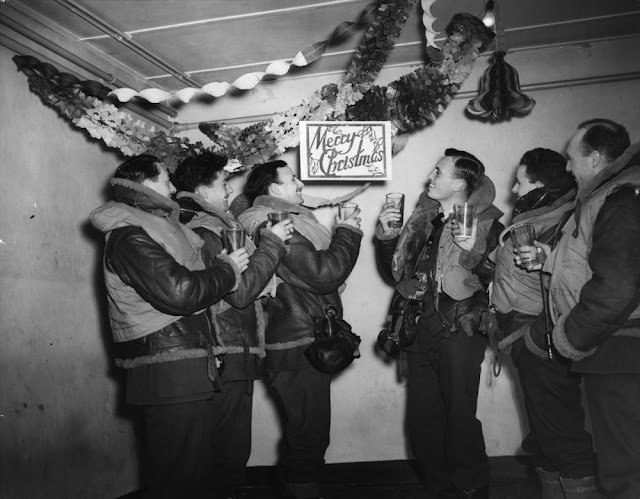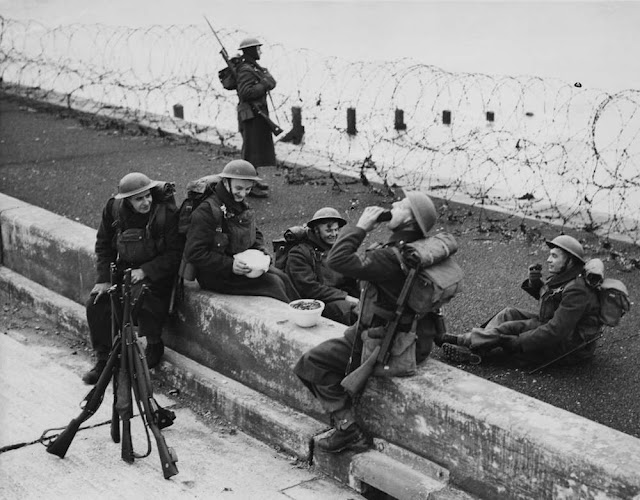Saturday 3 May 1941
 |
| SS Malakand, an ammunition ship that blew up during a Luftwaffe raid on Liverpool and sank six other ships. |
The RAF receives some reinforcements, four Blenheim bombers. The British today send reinforcements toward Iraq from Palestine and Transjordan, but they have a long march across the desert. Additional forces continue to trickle into Basra.
While the Anglo-Iraq War is usually overlooked by histories of World War II, the Axis takes it very seriously for one reason: oil. Iraqi oil supplies the Royal Navy and RAF with a large portion of their fuel. German Foreign Minister Ribbentrop radios the German ambassador in Baghdad today and orders him to request permission from the Vichy French government in Syria for Luftwaffe transit rights. The French quickly agree and even chip in by sending their own munitions and other supplies being stored in Syria to help the Iraqis. The Luftwaffe and Italians prepare to send planes to Iraq via Syria.
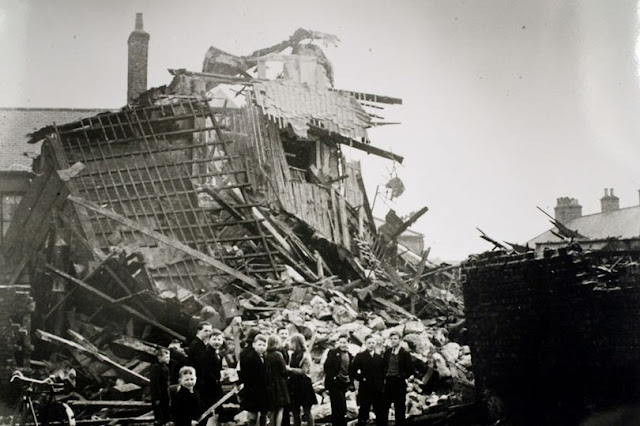 |
| A single bomb caused this massive destruction in North Shields on 3 May 1941. There are 107 deaths in a shelter underneath Wilkinson's Lemonade Factory. Of the 107 deaths, 42 are under the age of 16. |
The Luftwaffe is having great success at Liverpool. In fact, it may be the most successful series of Luftwaffe raids during the Battle of Britain. The pilots target port infrastructure and gradually are putting docks and deep-water berths out of commission. The total tonnage of cargo being landed is falling drastically. This is a relatively rare instance when the Axis pilots "get it right" and successfully attack the right targets with great efficiency.
- 6598-ton freighter Elstree Grange
- 1453-ton freighter Domino
- 7924-ton freighter Tacoma Star (later raised)
- 6770-ton freighter Silversandal
- barge Ellesport
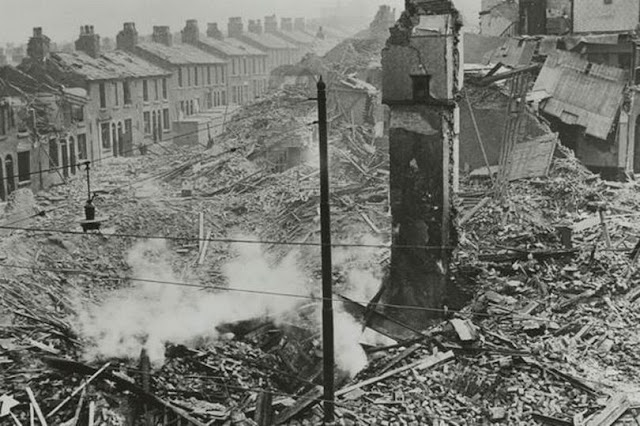 |
| County Road in Walton following the bombing in May 1941. |
Other ships lost in Liverpool during the bombing:
- 138-ton sailing barge Barnacle
- 65-ton tug Bonita
- 58-ton motor barge Emily Burton
- 168-ton sailing barge Pike
- 164-ton sailing barge Ling
- 82-ton steam barge Walton
- 176-ton sailing barge Silverdale
- 79-ton ship Ivy P.
- 106-ton flat Grosvenvor Rover Brill
- 143-ton flat Dace
- 143-ton flat Luce
- 81-ton flat Mus
- 91-ton flat Ray
- 108-ton flat Roach
- 7-ton launch Surveyor
- 177-ton barge Longendale
- 55-ton barge Ellesport
- barges Orrell and Pike
- 3778-ton Norwegian freighter Bra-Kar.
- 12,614-ton Australian liner Australian Star
- 3178-ton freighter Cantal (one death)
- 8663-ton freighter Baronese
- 6479-ton freighter Lobos
- 208-ton tug Wapiti
- 7921-ton freighter Mahout
- 13,031-ton tanker San Fabian
- 943-ton freighter Busiris
- 164-ton sailing barge Limpet
- 133-ton sailing barge Oyster
- 166-ton sailing barge Glitto
- 159-ton sailing barge Clam
- 3582-ton freighter Kadin (Greek)
- 6447-ton freighter Salland (Dutch)
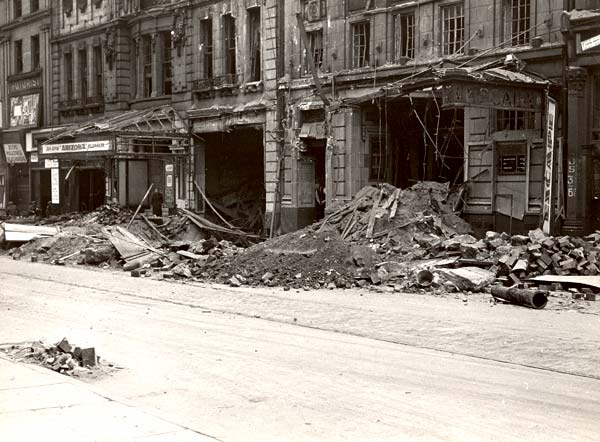 |
| La Scala Cinema, Lime Street, Liverpool, bomb damage, 3 May 1941. |
The Luftwaffe has been using advanced radio direction-finding equipment (Y-Gerät aka Wotan) to locate Liverpool at night. Some Heinkel He 111 bombers bearing direction-finding equipment have been shot down relatively intact earlier in the Battle of Britain, and the British have been studying the technology in order to jam the radio signals. The British have found that, by pure chance, the radio frequency the Germans have been using is the same as a BBC television transmitter at Alexandra Palace. The British have been gradually increasing signals from this television transmission to jam the Luftwaffe signals, and that campaign gradually is bearing fruit. However, the Luftwaffe can find its targets by other means, and Liverpool continues to suffer.
Demonstrating its depth, the Luftwaffe also mounts other raids. One, on Portsmouth, damages light cruiser HMS Sirius, which is under construction. Other Luftwaffe raids sink 2722 ton British freighter Royston in the Humber, and sink 1347 ton Norwegian freighter Trajan and damage 1143 ton Norwegian freighter Sitona northeast of Blakeney. Bombs fall throughout the northeast, including at Newcastle, Tynemouth, Throckley, Catcleugh, Morpeth, Lynemouth, Gosforth, Clifton and Stannington in Northumberland, Sunderland, West Hartlepool, Gateshead, Tees Bridge Roundabout at Billingham, Lambton Park, Castletown, Ryhope and South Shields in Co Durham and York and Hull in Yorkshire.
RAF Bomber Command sends 21 Blenheims against shipping off the French coast. Two from 2 Group/101 Squadron are shot down near Boulogne. After dark, Bomber Command sends 101 aircraft against Cologne, with a diversionary attack by 33 bombers against shipping at Brest.
 |
| Damage in Liverpool during the May Blitz. |
Mayne is approaching from the north, and he plans to squeeze the Italian defenders via a pincer move on the east and west. The 5th Indian Division also is approaching from Eritrea and forcing its way through the Falaga Pass, while some South African troops also are on the way. The Italian troops are led by Amedeo, 3rd Duke of Aosta, who is noted for his gallantry - for instance, he has respected the property of (formerly) exiled Emperor Haile Selassie. Morale among the Italians (actually, mostly colonial troops) remains fairly good, but several hundred surrender during the day.
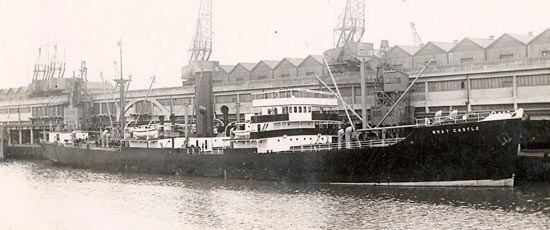 |
| The Wray Castle, sunk on 3 May 1941 by U-103 off Freetown. |
U-95 (Kptlt. Gerd Schreiber), also on its fourth patrol, torpedoes and sinks 4873-ton Norwegian freighter Taranger about 150 nautical miles (280 km, 170 miles) southwest of Reykjavik, Iceland in the Atlantic. There are two deaths.
British 468 ton freighter Corbet hits a mine and sinks just off Herculaneum Dock in Liverpool. There are 8 deaths and one man survives.
176-ton coaster Sirius hits a mine and sinks at the Albert Dock in London.
Royal Navy boarding vessel HMS Hilary captures 5595-ton Italian tanker Recco in the Atlantic. The crew of the Recco later manages to scuttle the ship.
The British Admiralty recalls battlecruiser HMS Hood from patrol off Iceland to Scapa Flow. Hood and its accompanying four destroyers call at Reykjavik to refuel.
Minelayer HMS Teviotbank lays minefield BS.55 in the English Channel.
The Kriegsmarine's overseas supply network remains intact. Today, tanker Nordmark has a rendezvous with U-105 and U-107 at sea. These supply arrangements greatly extend the U-boat range and mission duration, effectively amplifying the power of the fleet.
Royal Navy submarine HMS P-32 (Lt. David A. B. Abdy) is commissioned, minesweeping trawler Rosalind is launched.
U-205 (Kapitänleutnant Franz-Georg Reschke) and U-451 (Korvettenkapitän Eberhard Hoffmann) are commissioned, U-116 and U-654 are launched.
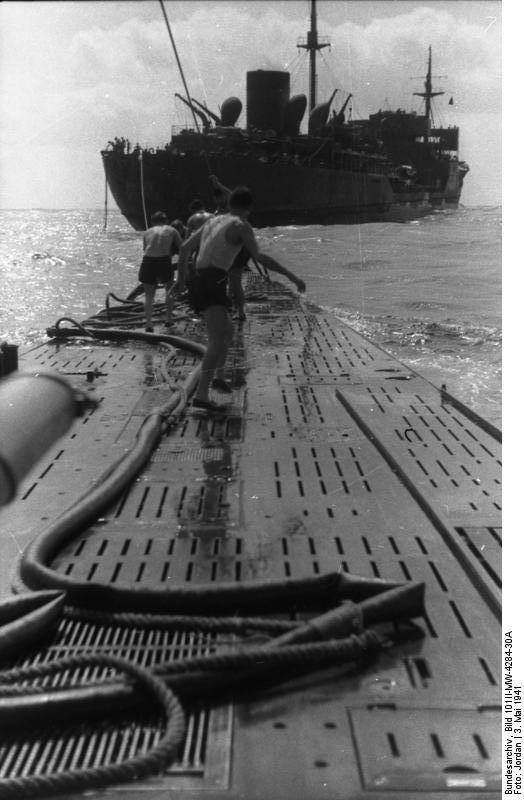 |
| U-107 hooks up with the Nordmark in the Atlantic, 3 May 1941 (Jordan, Federal Archives). |
The British at Tobruk have numerous assets with which to defend Tobruk, and one that they will return to again and again during the war on beachheads is naval shelling. Destroyers HMS Decoy and Defender shell the British positions in Tobruk during the night to support the Australian attack, then return to Alexandria.
The Luftwaffe raids Suda Bay, Crete, and damages 7258-ton freighter Araybank. The ship is bombed again later in the month and destroyed.
The RAF raids Italian shipping in Tripoli. The planes sink 5305-ton Italian freighter Birmania, which explodes and takes with it 3339-ton freighter Citta D'Bari. Italian torpedo boat Canopo also sinks.
Royal Navy cruiser HMS Gloucester hits a mine early in the morning near Gibraltar. As Gloucester limps back to port, Italian bombers attack it and manage only a minor hit. The ship makes it back to port.
Italian 838-ton freighter hits a mine and sinks in Tripoli Harbour.
Submarine HMS Triumph surfaces and uses its deck gun to sink 425-ton Italian freighter Tugnin F. about a dozen miles northwest of Mersa Brega.
Submarine HMS Usk is reported overdue today, and it never turns up. Ultimately, it is presumed to have been lost around 1 May 1941 off Cape Bon.
At Malta, the Luftwaffe raids Floriana for the first time in a major attack by 30 bombers. There are 9 Royal Engineers and one local employee killed when an aerial mine lands on a barracks. There is extensive damage to the docks and St. Publius Church.
Anglo/Polish Relations: On the 150th anniversary of the establishment of the Polish Constitution, Winston Churchill makes a radio broadcast directed, as he puts it, "to the Polish people all over the world." He calls the German occupiers of Poland "pitiless and venal" and "mechanized barbarians." He cautions that the war will be "long and hard," but "the end will reward all toil, all disappointments, all suffering."
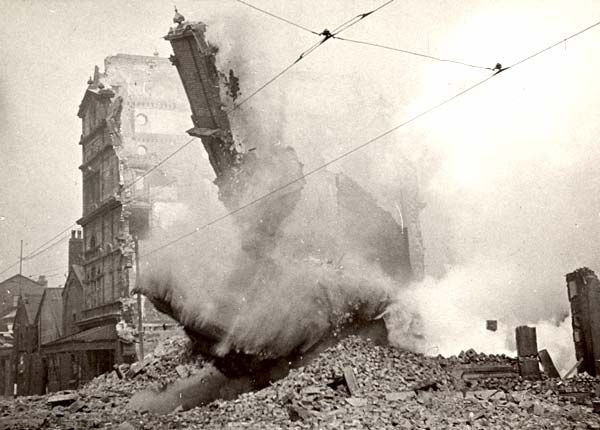 |
| The Rotunda Theatre on Stanley Road, Bootle, Liverpool collapses following the bombing on 3/4 May 1941. |
Anglo/US Relations: The Royal Navy has been using US ports for refits, and this pattern continues when light cruiser HMS Delhi arrives today in New York.
US Military: The Panama Canal Zone is assigned to the Panama Sector of the US Caribbean Defense Command.
Scientific Research: The University of California at Berkeley professor Glenn T. Seaborg and his team isolate plutonium as the best material for an atomic bomb.
South Africa: General Jan Smuts addresses the House of Assembly and reveals that South African troops are going to Egypt.
 |
| While the Germans hold a victory parade in Athens on 3 May 1941, British stragglers (in a lorry with shot-out windshields) continue to struggle to Nafplio for possible rescue. © IWM (E 2733). |
Yugoslavia: The Italians annex part of Slovenia and create the Province of Ljubljana.
Cambodia: Prince Norodom Sihanouk is crowned king of Cambodia.
China: The Japanese raid Chungking.
American Homefront: Frank Capra film "Meet John Doe," starring Gary Cooper and Barbara Stanwyck, opens to generally favorable, but mixed, reviews. The Warner Bros. film will go on to be listed on the 2006 American Film Institute "100 Years... 100 Cheers" list at No. 49.
Whirlaway wins the Kentucky Derby in the record time of 2:01 2/5.
 |
| 4th Annual Field Day at Texas A&M AgriLife Research & Extension Center, Overton, Texas, May 3, 1941. |
May 1941
May 1, 1941: British Hold Tobruk
May 2, 1941: Anglo-Iraq War
May 3, 1941: Liverpool Hammered
May 4, 1941: Hitler Victory Speech
May 5, 1941: Patriots Day
May 6, 1941: Stalin In Command
May 7, 1941: May Blitz
May 8, 1941: Pinguin Sunk
May 9, 1941: U-110 Captured
May 10, 1941: Hess Flies Into History
May 11, 1941: The Hess Peace Plan
May 12, 1941: Tiger Arrives Safely
May 13, 1941: Keitel's Illegal Order
May 14, 1941: Holocaust in Paris
May 15, 1941: Operation Brevity
May 16, 1941: Blitz Ends
May 17, 1941: Habbaniya Relieved
May 18, 1941: Croatia Partitioned
May 19, 1941: Bismarck at Sea
May 20, 1941: Invasion of Crete
May 21, 1941: Robin Moore Sinking
May 22, 1941: Royal Navy Destruction Off Crete
May 23, 1941: Crete Must Be Won
May 24, 1941: Bismarck Sinks Hood
May 25, 1941: Lütjens' Brilliant Maneuver
May 26, 1941: Bismarck Stopped
May 27, 1941: Bismarck Sunk
May 28, 1941: Crete Lost
May 29, 1941: Royal Navy Mauled Off Crete
May 30, 1941: Sorge Warns, Stalin Ignores
May 31, 1941: British Take Baghdad
2020
